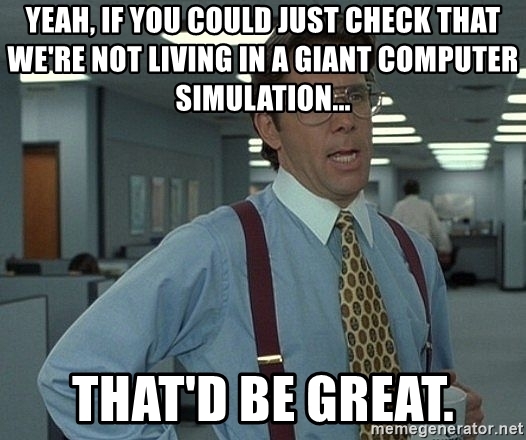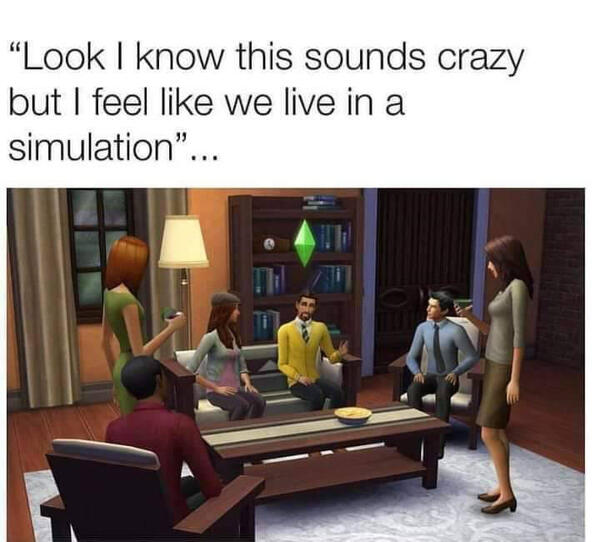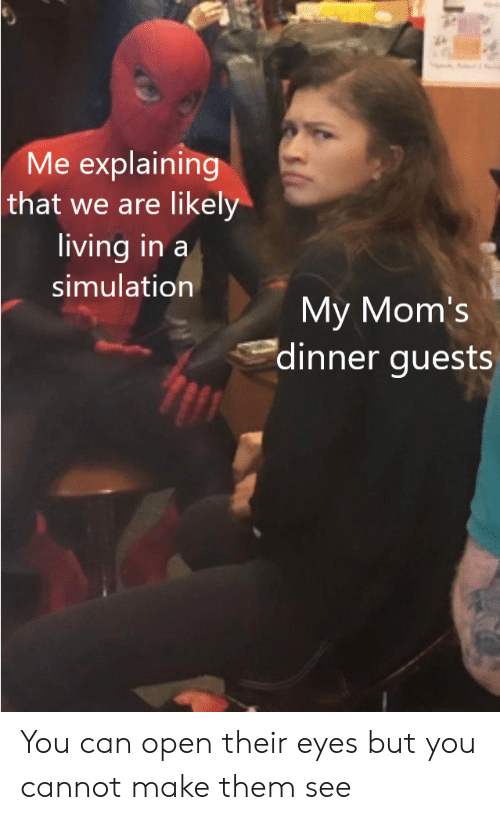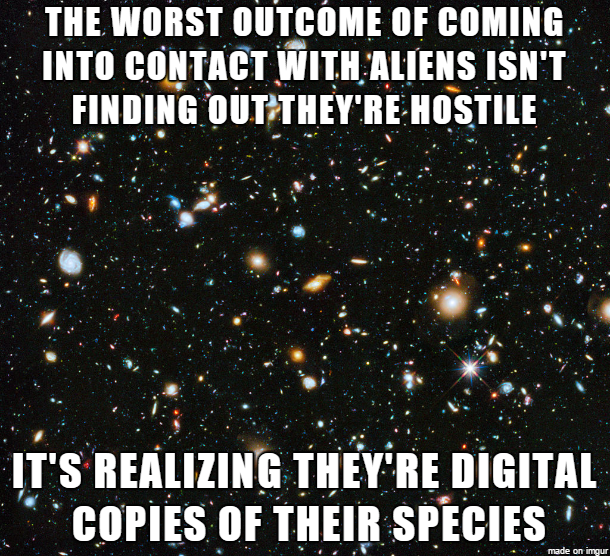

We probably live there
Among computer scientists circulates a proposition: we live in a simulation.
The argument goes like this: We will find a way to simulate history, alternative history, or life in general. If we can do something, we probably will.
The simulations will get better and better until they resemble the real world. Such simulations will be so advanced that they can start a simulation themselves, for instance, another simulation of us.
That means there will be many simulations within simulations within simulations. It starts (possibly) an infinite chain of simulations. And all these simulations (or realities) have just one starting point.
To think we are at the start is too optimistic.
It is the same us you waiting in a long queue where you don't see how many people are in front of you. The best estimate would be to tell how many people are behind you. You are probably in the middle. So far, there are none. But we can see people wanting to join the queue. After someone joined behind you, you are not probably the first one. So creating a realistic simulation means we are not originals.
These are reasons why we might live in a simulation. I mainly want to think about what it means to us. We might never know. But since it is Pascal's wager, we should consider the possibility.
How does it work?
The question is: how complicated is the world above (simulating us). If our universe is just a proof of concept: "Look, I can create a universe that has only four basic forces!" In that case, we can expect our simulators to be more advanced than us and wildly different.
I don't think it's true. Our universe is similarly complicated as the previous. Or the universe is complex enough to be interesting.
So far, our simulations are simple. We cannot simulate every atom, but at some point, we might create a powerful computer that computes all matter in our solar system and all forces affecting it from outside.
We should not constrain our imagination by an image of a computer. The device simulating us might be a "pocket universe." It would be a parallel universe with specific initial conditions. So our universe can be the computational machine. In that sense, in a multiverse (collection of universes), our universe is as real as the simulator's universe. (But then we just pushed our problem of finding our creator by one level higher.)
Most probably, we can do everything that our simulators can do. It is good because we might have impact outside our simulation.
Who are the simulators?
The easiest is to imagine our simulators as humans (humanoids) in the future. We would also simulate ourselves. It guarantees results. If you simulate a universe that cannot sustain life, it would be boring after some point. I would want to observe how (alternative) history might have unfolded. (But maybe I'm influenced by this channel.)
We might be simulated by human enemies trying to understand us to beat the originals.
Finally, we might be only a byproduct of someone else's simulation. But let's skip that. If we cannot guess who our simulators are, then our life is just randomness.
Why were we created?
If someone simulates us, there should be a purpose for it. And that's a good thing. You have a purpose in life. But since it's not God-given, we might be again at ground zero. It provides a subgoal we can follow: have a beneficial impact somewhere outside your universe.
We might be observed and studied. It might be a psychology simulation, or maybe we are replicating a scene from history (who wouldn't want to see Caesar). If we are history simulated, you can hope that we live in a civilization that will survive a bit in the future.
We might be used to test a hypothesis about a past. What happens if some initial conditions are perturbed. It also means our nature would not destroy us, but it's not sure.
Maybe our simulators want to pick up some people from the simulation. Society evolved to be pacifistic. Now, it needs a leader that can apply the right amount of violence.
Will we be turned off?
It depends on how expensive sustaining the simulation is. It should not be too demanding. Otherwise, the argument about an infinite chain of simulations might not hold.
Assuming it's not too expensive, the society simulating us is likely to value life (consciousness). Creating something living and killing it might be regarded as evil.
The good news is that our turning-off point would also be probably painless. We would only stop existing. So far, life is not constant suffering, so our simulators might make it even pleasant.
There is also a compromise. If the simulation takes too much energy, it can be slowed. The time would tick more slowly. We wouldn't tell, but the energy consumption would be lower.
What should we do?
The worst thing would be to make the simulation shut off or slow down. Our creators might have three reasons:
- We fulfill our purpose of simulation.
- The aim gets fulfilled by another simulation.
- We start to be boring.
The third bullet is easy to counter.
Be interesting!
Express as much creativity as possible.
You should explore and research.
You should create and procreate.
You should sing and play.
Creating wealth and investing is an interesting option.
Just consumption is boring.
I'm a fan of a scenario where our simulators need some expertise and someone from simulation gets picked up. To get picked up, you should be exceptional. Anyway, it combines well with being interesting.
If there is the possibility, I would love to be awakened from the simulation and shown the world above. (Conditioned on the fact it exists, I don't want to live in a simulation, I want to be original.) It would be fun.
If we differ too much from our simulators, we might become a curiosity for a while. Then we will be useless. We should be at least a bit similar to our parent simulation. We don't know too much about what they value, except one thing: They do simulate us. It means we should strive to start our simulations.
If you believe that you stop existing after achieving the goal, the best thing is not to do anything (and enjoy life). Then you can hope that other simulations will figure it out too and act the same.
Conclusion
Be interesting! Be exceptional!
The probability of living in a simulation is substantial. Interestingly, it doesn't clash with other believes much. There can still be God.
At least as I see it, the belief in simulation motivates me to create more. If you don't, you can be responsible for the end of the world. That is a powerful motivation.

